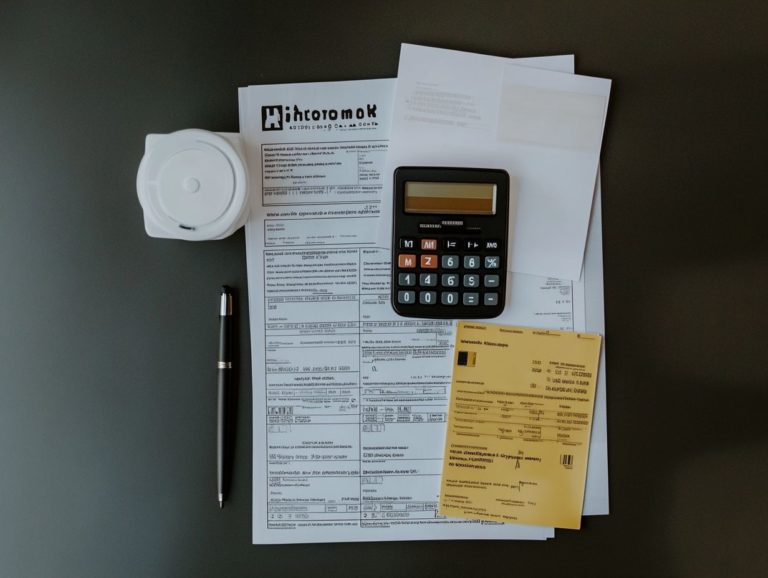How to File Taxes as a Freelance Consultant
Get ready to tackle tax season with confidence! Navigating the world of taxes as a freelance consultant can feel overwhelming. With your unique tax obligations, specific record-keeping requirements, and numerous deductions available, it s essential to manage your financial responsibilities with finesse.
This guide helps you understand the various tax responsibilities you encounter and streamline your finances for a seamless tax season. You will also uncover common deductions that can work in your favor.
You ll delve into filing options, necessary paperwork, and savvy tips to minimize your tax burden. Whether you re a seasoned freelancer or just starting your journey, this overview will equip you to approach tax season with clarity.
Contents
- Key Takeaways:
- Understanding Tax Requirements for Freelance Consultants
- Organizing Your Finances for Tax Season
- Common Tax Deductions for Freelance Consultants
- Filing Taxes as a Freelance Consultant
- Navigating Tax Forms and Paperwork
- Tax Tips for Freelance Consultants
- Frequently Asked Questions
- 1. What is the first step to filing taxes as a freelance consultant?
- 2. Do I need to file taxes if I am a freelance consultant?
- 3. What is self-employment tax and how is it calculated?
- 4. Can I deduct business expenses as a freelance consultant?
- 5. Should I file my taxes as a freelance consultant as an individual or as a business entity?
- 6. When is the deadline to file taxes as a freelance consultant?
Key Takeaways:

- Understand the different tax obligations for freelance consultants to avoid penalties and fines.
- Keep your finances organized by tracking expenses and maintaining accurate records for smoother tax filing.
- Take advantage of tax deductions to lower your tax liability as a freelance consultant.
Understanding Tax Requirements for Freelance Consultants
Grasping the intricacies of tax requirements as a freelance consultant is essential for maintaining compliance and sidestepping penalties from the IRS. As a freelancer, you operate as a self-employed person, which introduces a set of unique tax obligations that differ significantly from those of traditional employees.
This includes accurately reporting your income, deducting eligible expenses, and managing responsibilities tied to estimated taxes, self-employment tax (a tax that freelancers pay to cover Social Security and Medicare), and sound accounting practices.
To thrive in your freelance career, cultivating a robust understanding of financial reporting is crucial. This ensures you fulfill your obligations while maximizing your tax benefits.
Different Tax Obligations for Freelancers
Freelancers face various tax responsibilities that require careful planning and strict adherence to IRS regulations, including self-employment tax, income tax, and estimated taxes based on earnings from clients.
Understanding these different tax types is essential, as they can significantly influence your financial landscape throughout the year. When you work with clients, you’ll typically receive 1099-MISC forms that report income earned without any taxes withheld.
This independent contractor status requires you to calculate and remit the appropriate estimated taxes quarterly. This task necessitates diligent tracking of both income and expenses.
Tax rules change from state to state, so knowing your local laws is key! A freelancer in California may face different taxes than one in Texas. Staying informed about local tax laws is not just good practice; it s crucial for ensuring compliance and maintaining your financial health.
Organizing Your Finances for Tax Season
Organizing your finances for tax season is crucial for freelance consultants to facilitate a seamless filing experience and maximize deductions. This requires implementing systematic record-keeping practices that effectively track all income and expenses throughout the year.
By keeping your financial documents in order, you can substantiate your deductions, ultimately reducing your tax liability. Properly categorizing client payments, invoices, and various business-related expenses not only simplifies the filing process but may also reveal opportunities for significant tax savings.
Start today to streamline your finances and maximize those deductions – your future self will thank you!
Record-keeping and Expense Tracking
Effective record-keeping and expense tracking are essential for you as a freelancer. They ensure that every income is accurately reported and backed up come tax season. Using financial software can significantly simplify this process.
By using various methods like spreadsheets, dedicated financial software, and mobile apps you can simplify this often overwhelming task. These tools not only help organize your financial data but also provide valuable insights into your spending habits. This makes it easier to identify potential deductions.
Tracking all business-related expenses, from office supplies and software subscriptions to travel costs, can significantly boost your eligible tax deductions. Maintain a well-organized system for your receipts and invoices. Consider categorizing them by month or type of expense to ensure you can easily access everything when it s time to file your taxes.
Set reminders for regular updates to keep your financial records in order. This allows you to focus on your work without the anxiety of unexpected tax surprises.
Common Tax Deductions for Freelance Consultants

As a freelance consultant, you can capitalize on a variety of tax deductions to substantially lower your taxable income. It s essential to know which expenses qualify as deductions to optimize your financial landscape.
Common deductible expenses include costs associated with maintaining a home office, business-related travel, equipment purchases, and even professional development workshops. By categorizing and documenting these expenses meticulously, you can leverage your business structure to maximize your deductions while remaining compliant with the Internal Revenue Service (IRS) regulations.
Expenses You Can Write Off
As a freelance consultant, you can write off a range of expenses that bolster your business operations. Essentials include office supplies, software subscriptions, and unavoidable client-related travel costs.
When maintaining a home office, costs like utilities and internet service often qualify for deductions, reflecting the realities of remote work. Marketing expenses, such as website hosting fees and promotional materials, also qualify, allowing you to effectively broaden your client base.
Hiring professionals, like accountants and lawyers, offers another avenue for cost recovery. To stay compliant with IRS guidelines, it s crucial to keep meticulous records of all expenditures, including receipts and invoices. Categorize them clearly for a smooth tax preparation process.
Filing Taxes as a Freelance Consultant
Filing taxes as a freelance consultant requires a keen understanding of the IRS requirements. You’ll need to submit the correct tax returns and adhere to deadlines based on the income you ve received from clients, typically reported on forms like the 1099-MISC.
Being diligent about these details is essential for navigating the tax landscape smoothly.
Options for Filing and Deadlines
As a freelancer, you have various options for filing your taxes, whether it’s online software, accountant services, or the traditional paper filing method. Each choice comes with its own set of deadlines and requirements.
Navigating these options can feel daunting, especially if you’re new to self-employment. Using popular financial software like TurboTax simplifies the entire process, offering step-by-step guidance tailored to your unique situation. Additionally, considering tax planning tips for new freelancers can help you make informed decisions. Alternatively, hiring professionals, such as those at H&R Block, provides peace of mind, ensuring you remain compliant with all tax regulations.
Stay informed about filing deadlines to avoid penalties and make your submission experience as smooth as possible. With proactive planning, you can significantly enhance your financial management and enjoy a greater sense of tranquility during tax season.
Don t miss out on potential deductions! Start organizing your expenses today for a stress-free tax season!
Navigating tax forms and paperwork is an essential skill for you as a freelance consultant. Mastering this process ensures that you accurately report your income and deductions, especially when it comes to essential forms like the 1099-MISC and Schedule C.
Which Forms to Use and How to Fill Them Out

Freelancers must familiarize themselves with the essential tax forms, such as the 1099-MISC for reporting income and Schedule C for detailing business expenses and calculating profit.
Understanding these forms is important to follow the rules and ensure that all income is accurately reported to the IRS. For instance, when completing the 1099-MISC, you should carefully list all clients who paid you $600 or more during the tax year. Additionally, understanding taxable income for freelancers helps clarify how Schedule C provides the opportunity to outline various deductible expenses, such as office supplies and travel costs, which can significantly lower your taxable income.
It s easy for freelancers to slip up by omitting certain income sources or inaccurately claiming deductions. Therefore, it s crucial to double-check your entries and maintain meticulous records throughout the year. Diligence helps you avoid penalties. It also ensures your financial reporting is precise.
Tax Tips for Freelance Consultants
Tax tips can supercharge your finances! They help you maximize deductions, lower your tax burden, and elevate your overall financial planning. Consider participating in professional education workshops to stay updated on the latest tax strategies.
Maximizing Deductions and Minimizing Taxes
To maximize your deductions and minimize your taxes, it s essential to maintain meticulous records of all business-related expenses while staying updated on IRS regulations concerning allowable deductions.
This proactive strategy not only ensures compliance but also helps you pinpoint potential savings that might easily slip through the cracks. Use financial software tailored for tracking expenses it can simplify this process, making it a breeze to categorize and manage your receipts throughout the year.
Don’t miss out on the benefits of consulting tax professionals! Their expertise can make a huge difference, providing you with personalized advice on navigating the complexities of tax laws and identifying strategies that align with your specific business activities. Additionally, choosing the right tax software as a freelancer can enhance your planning process. By planning ahead, you can fully leverage available deductions, ultimately leading to a more favorable tax outcome.
Frequently Asked Questions
1. What is the first step to filing taxes as a freelance consultant?
The first step is to gather all of your income and expense records for the year. As a freelance consultant, you are responsible for reporting all of your earnings, so it’s important to have accurate records.
2. Do I need to file taxes if I am a freelance consultant?

Yes, as a self-employed individual, you are required to file taxes on your freelance income. You are responsible for paying both income tax and self-employment tax.
3. What is self-employment tax and how is it calculated?
Self-employment tax is a tax that covers your contributions to Social Security and Medicare as a self-employed individual. It is calculated based on your net income, which is your total income minus your deductible expenses.
4. Can I deduct business expenses as a freelance consultant?
Yes, you can deduct any legitimate business expenses from your freelance income. This includes expenses such as office supplies, equipment, travel, and marketing costs. Keep thorough records of these expenses to claim them on your tax return.
5. Should I file my taxes as a freelance consultant as an individual or as a business entity?
This depends on your personal situation and how much you earn from your freelance work. If you make a significant amount of money, it may be beneficial to form a business entity such as an LLC or S-Corp for tax purposes. It’s best to consult with a tax professional to determine the best option for you.
Now that you understand the essentials of tax filing as a freelance consultant, start organizing your records today and consult a professional if needed!
6. When is the deadline to file taxes as a freelance consultant?
As a freelance consultant, your tax filing deadline is April 15th. If this date falls on a holiday or weekend, you can file on the next business day.
Make sure to file your taxes on time. This will help you avoid penalties and interest charges that can add up quickly!






